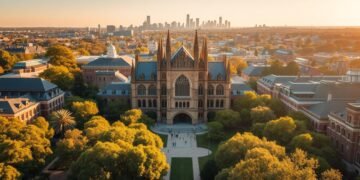Did you know Saudi Arabia is rapidly becoming a top destination for students worldwide? With 38 universities, including globally ranked institutions, the country offers modern campuses and cutting-edge programs. The government invests heavily in education, making it an attractive option for those seeking quality higher education.
Many programs are taught in English, especially in technical fields. Students can choose from public or private institutions, with some offering gender-segregated options. Whether you’re interested in engineering, medicine, or business, Saudi Arabia provides diverse opportunities.
Key Takeaways
- Saudi Arabia has 38 universities, with seven ranked globally.
- The government heavily invests in education infrastructure.
- English-taught programs are widely available.
- Both public and private institutions offer varied options.
- Cultural adaptation and visa processes are key considerations.
Why Study in Saudi Arabia?
The Kingdom of Saudi Arabia has transformed into a hub for top-tier education. With globally ranked institutions and a focus on innovation, it attracts students seeking excellence. The blend of cultural heritage and modern academia makes it unique.
World-Class Universities
King Fahd University of Petroleum and Minerals leads as the #1 engineering school in the Arab region. Seven Saudi universities rank globally, offering cutting-edge labs and research facilities. These institutions rival Western counterparts in quality and resources.
Diverse Programs in English
Over 94% of Master Trainer Programme graduates pass rigorous assessments. Private universities and technical fields now deliver English-taught degrees in medicine, IT, and business. This removes language barriers for international learners.
Government Investment in Education
A $21.33 billion fund fuels education reforms, including scholarships covering tuition, housing, and annual flights. Partnerships with Pearson enhance STEM teaching through digital tools. The government commitment ensures sustainable growth in higher education.
Cultural immersion here is unparalleled. Students experience a society balancing tradition with rapid modernization. From historic sites to tech-driven cities, Saudi Arabia offers a dynamic academic journey.
Top Universities in Saudi Arabia
Saudi Arabia’s higher education landscape boasts globally recognized institutions with specialized programs. These universities blend rigorous academics with state-of-the-art facilities, offering unique advantages for international students.

King Abdulaziz University
With over 145,000 students, King Abdulaziz University (KAU) ranks among the largest in the region. It excels in marine sciences, supported by coastal research centers. The university also partners with global institutions to enhance STEM curricula.
King Fahd University of Petroleum and Minerals
King Fahd University (KFUPM) is a leader in energy education, with deep ties to the petroleum industry. International graduate students pay SR 550 per credit hour. Programs require 32–39 credits, emphasizing hands-on training in petroleum minerals.
King Saud University
Established in 1957, King Saud University (KSU) is the Kingdom’s first university. It hosts 40,000+ students across 145 research centers. KSU’s endowment fuels projects in medicine, agriculture, and engineering.
Private institutions like KAUST complement these options. Its $20 billion endowment focuses on applied sciences, offering fully funded research programs. Whether public or private, Saudi universities deliver world-class education.
Degree Programs Available
From bachelor’s to doctoral levels, academic opportunities here cater to diverse interests. Universities offer structured pathways with industry-aligned curricula. Whether aiming for technical expertise or research excellence, students find programs tailored to their goals.
Bachelor’s Programs
A 4-year bachelor’s degree requires a General Secondary Education Certificate. Courses combine foundational and specialized training. Fields like engineering and business dominate, but humanities options exist.
Private colleges also offer vocational diplomas. These focus on practical skills, often completed in 2–3 years. University degrees, however, provide broader career flexibility.
Master’s Programs
Most master’s programs span two years. Applicants need relevant bachelor’s degrees and GRE/TOEFL scores. Technical fields like IT and petroleum engineering are popular.
Umm Al-Qura University excels in Islamic law, while KFUPM leads in energy studies. Research-based tracks often include thesis work.
Doctoral Programs
PhDs take 2.5–5 years, with full funding covering tuition and stipends up to SR 9,000 monthly. Candidates must propose original research aligned with national priorities.
KAUST specializes in applied sciences, offering labs with cutting-edge equipment. Over 71% of local graduates pursue postgraduate education.
Entry Requirements for International Students
International applicants must meet specific academic and language standards to enroll in Saudi universities. The process involves document verification and standardized testing to ensure eligibility. Competitive programs often require a minimum 3.0 GPA and authenticated credentials.

High School Diploma and Transcripts
Non-Saudi graduates must notarize academic records through their home country’s Saudi Cultural Mission. This includes:
- Original diplomas with certified English translations
- Official transcripts showing course grades
- Authentication stamps from relevant ministries
Some institutions accept provisional certificates while final documents are processed.
Language Proficiency Tests
English-taught programs require proof of fluency. Accepted tests include:
- TOEFL (79+ iBT)
- IELTS (6.5+ overall)
- PTE Academic (53+)
Conditional admission allows language preparation at universities like Princess Nourah bint Abdulrahman University (PNU).
Standardized Test Scores
Graduate applicants often submit GRE results. Competitive scores vary by field:
- Engineering: 160+ Quantitative
- Business: 150+ Verbal
- Sciences: 3.5+ Analytical Writing
Complete applications include recommendation letters, passport copies, and attested transcripts. Meeting these requirements streamlines approval for international students.
How to Apply to Study in Saudi
Applying to universities in Saudi Arabia requires careful planning and attention to detail. Unlike some countries, there’s no centralized portal—each institution manages its own admission process. Start early to meet deadlines and gather all required materials.
Application Process Overview
First, research universities and programs that match your goals. Most applications are submitted online through the school’s portal. After submitting, track your status regularly.
Scholarship applications often run parallel to admission. Apply for both simultaneously to avoid delays. Processing times vary, but visas typically take 6–8 weeks after acceptance.
Required Documents
Prepare these essentials:
- Motivation letter outlining your academic goals
- Updated CV with relevant experience
- Health clearance certificate
- Notarized transcripts and diplomas
Some programs may request additional items like portfolios or research proposals.
Application Deadlines
Fall semester deadlines usually fall by June 30. However, top-tier schools like KAUST use rolling admission. Always verify dates on the university’s website.
Public universities often have stricter cutoffs than private ones. Late submissions are rarely accepted, so prioritize timeliness.
Student Visa Requirements
Securing a student visa for Saudi Arabia involves specific steps every applicant must follow. The process requires university sponsorship, with all international learners needing approved funding. Prepare for embassy interviews and document authentication early to avoid delays.

Visa Application Process
Applicants must submit a police clearance certificate and attend an embassy interview. Universities act as sponsors, issuing admission letters for visa approval. Processing takes 6–8 weeks, with tracking available via the Ministry of Foreign Affairs (MOFA).
Required documents include:
- Passport valid for 6+ months
- Medical fitness certificate
- Sponsorship letter from the admitting institution
Scholarship Requirement
All international students must secure a scholarship. Full awards cover tuition and provide a SR 3,000 monthly stipend. Partial options may require additional proof of funds.
Funded applicants receive priority visa processing. Private insurance is mandatory if the university plan doesn’t meet SR 800/year minimums.
Health Insurance
Health insurance is non-negotiable for visa approval. Most universities include basic coverage, but private plans offer broader benefits. Compare policies for inpatient care and emergency services.
Visa holders cannot work off-campus and must maintain 80% attendance. Violations risk cancellation. Contact MOFA (+966 11 401 6666) for application updates.
Language Requirements
Language skills open doors to academic success in Saudi Arabia’s universities. Institutions cater to international students with flexible options, from full English curricula to immersive Arabic training. Whether you’re fluent in English or eager to learn Arabic, programs adapt to diverse needs.
English-Taught Programs
Many top universities deliver degrees entirely in English. KAUST, Alfaisal University, and KFUPM lead with English-taught programs in engineering, medicine, and business. These eliminate language barriers for global learners.
Pearson’s MyMathLab supports preparatory years, bridging gaps for non-native speakers. Graduates from Anglophone countries may skip language tests with prior degree proof.
Arabic Language Preparation
For cultural immersion, Arabic courses range from semester-long classes to summer intensives. The I Can Talk Institute offers a 6-month program for SR 12,000, covering dialects like Najdi and Hijazi.
Learning Arabic enhances daily life and career prospects. Universities partner with Rosetta Stone and host language centers for structured practice.
- Resource list: University language labs, Rosetta Stone subscriptions, community language exchanges
- Dialect tips: Hijazi suits coastal cities; Najdi dominates central regions
Costs of Studying in Saudi Arabia
Budgeting for academic pursuits requires a clear breakdown of tuition fees and living expenses. The Kingdom offers options ranging from fully funded programs to self-paid degrees, accommodating diverse financial situations.

Tuition Fees
Public universities charge minimal tuition fees, often under SR 5,000/year for bachelor’s degrees. Private institutions like Alfaisal University may cost SR 24,000 annually. PhD programs at KAUST are typically fully funded, covering all academic expenses.
Living Expenses
Monthly living expenses average SR 2,500–4,000. Groceries cost around SR 800, while transport ranges from SR 300–600. Shared housing near campuses helps reduce costs significantly.
Scholarships and Funding
The King Abdullah Scholarship Program (KASP) covers tuition, housing, and annual flights. Niche options like Aramco STEM grants support technical fields. Self-funded students must provide bank attestations proving SR 60,000/year minimum balance.
Planning ahead ensures financial stability throughout your academic journey. Explore all scholarships and funding avenues to maximize opportunities.
Student Accommodation Options
Finding the right place to live is a top priority for students heading to Saudi Arabia. Universities and private landlords offer varied choices, from budget-friendly dorms to modern apartments. Whether you prefer campus convenience or independent living, there’s an option to match your needs.
University Housing
Most universities provide on-campus student housing with amenities like 24/7 security and shared kitchens. King Abdulaziz University (KAU) offers gender-segregated dorms starting at SR 450/month. Prayer rooms and laundry facilities are standard.
Costs range from SR 500–1,200 monthly. These residences simplify commutes and foster campus communities. Early applications are recommended due to high demand.
Private Rentals
Off-campus accommodation includes apartments and shared villas. A one-bedroom in Riyadh averages SR 30,000/year. Popular platforms like Aqar and Bayut list verified properties.
Leases typically require a 1-year commitment and a 2-month security deposit. Note that some compounds are family-only, while bachelor housing is available in major cities.
- Cost comparison: University housing (SR 500–1,200) vs. private rentals (SR 1,500–3,500).
- Key platforms: Aqar, Bayut, Haraj for listings.
- Cultural norms: Separate housing for single students and families.
Working While Studying
Balancing academics and employment in Saudi Arabia requires understanding local labor laws. The Kingdom permits limited work options for students, with strict regulations to protect both learners and employers. Before seeking part-time roles, familiarize yourself with key policies.
Understanding Visa Restrictions
Labor law Article 37 prohibits general employment for student visa holders. Violations incur fines up to SR 50,000 and possible deportation. However, exceptions exist for university-approved positions.
Permissible roles include:
- Research assistantships (max 20 hours/week)
- Ministry-approved paid internships
- Campus conference volunteers
Exploring Part-Time Opportunities
Universities often hire learners for administrative support or lab monitoring. These roles pay SR 25–50/hour and require special permits. The Ministry of Education must authorize each position.
For flexibility, consider remote work with international employers. Digital roles in tutoring, content creation, or programming bypass local visa restrictions. Always confirm tax obligations in both countries.
Student Life in Saudi Arabia
Beyond academics, Saudi campuses offer rich cultural exchanges and modern amenities. With 94% smartphone penetration, students stay connected while exploring local traditions. Universities blend tech-driven conveniences with vibrant social scenes.
Campus Culture
Gender-segregated clubs at Princess Nourah University foster inclusive campus culture. Events like the Janadriyah Festival showcase heritage through music and art. Tech hackathons and startup incubators attract innovators.
Recreational facilities include Olympic pools and equestrian centers. Dress codes are relaxed on campus—abayas are recommended but not mandatory. Respect for prayer times and local customs is key.
Social Activities
Student life thrives beyond classrooms. Popular apps like HungerStation (food delivery) and Tawakkalna (health tracking) simplify daily routines. Uber operates in major cities for hassle-free transport.
Weekends often feature desert camping or coastal trips. Universities organize intercultural dialogues, blending global perspectives with Saudi traditions.
Cultural Adaptation
Ramadan offers a profound experience for cultural adaptation. Daytime fasting is optional for non-Muslims, but public eating is discouraged. Evening iftar meals become communal celebrations.
Learning basic Arabic phrases (e.g., “Shukran” for thank you) builds rapport. Most locals welcome questions about customs, fostering mutual understanding.
Life After Graduation
Graduates in Saudi Arabia enter a dynamic job market with unique opportunities. With expats comprising 33% of the workforce, international alumni can leverage specialized skills in high-growth sectors. Strategic planning ensures a smooth transition from academia to professional life.
Job Opportunities in High-Demand Fields
The Kingdom’s Vision 2030 fuels demand for talent in AI (NEOM projects) and renewable energy (Red Sea Project). Engineers earn up to SR 15,000/month, while humanities graduates average SR 8,000. Alumni networks at Aramco and SABIC provide valuable connections.
Saudization quotas prioritize locals in some sectors, but exceptions exist for specialized roles. The Nitaqat system classifies companies by compliance, affecting hiring trends. Research employers’ classifications to target visa-friendly opportunities.
Post-Study Visa Conversion
Graduates have a 30-day window to convert student visas to work permits. Required steps include:
- Employer sponsorship through the Ministry of Labor
- Medical tests and fingerprinting at Jawazat centers
- Proof of degree attestation from the Saudi Cultural Mission
Some universities assist with visa transitions, especially for STEM graduates. Private sector roles often process permits faster than government positions.
Conclusion
Global learners find transformative opportunities within Saudi institutions. With fully funded PhDs, cutting-edge labs, and rich cultural exposure, the Kingdom offers a unique blend of academic rigor and personal growth.
Proactively connect with admissions offices to navigate requirements. Vision 2030 fuels expansion in higher education, creating dynamic pathways for international talent.
Final checklist:
– Attest diplomas and transcripts.
– Apply for scholarships early.
– Research local customs for smoother adaptation.
Ready to start? Download our application timeline PDF to streamline your journey to Saudi Arabia’s top universities.
FAQ
What are the top universities in Saudi Arabia?
Leading institutions include King Abdulaziz University, King Fahd University of Petroleum and Minerals, and King Saud University. These schools offer globally recognized programs.
Are there English-taught degree programs available?
Yes, many universities provide English-medium courses, especially in engineering, business, and sciences. Some require Arabic proficiency for certain programs.
What documents are needed for a student visa?
You’ll need an admission letter, passport copies, medical reports, proof of financial support, and sometimes a police clearance certificate. Scholarship holders get additional assistance.
Can international students work while studying?
Part-time work is restricted but possible with university approval. Graduates may qualify for temporary work permits while seeking full-time employment.
How much does accommodation cost?
On-campus housing ranges from 0-,000 annually. Private rentals vary by city, with Riyadh and Jeddah being more expensive than smaller towns.
What scholarships exist for foreign students?
The Saudi government offers full scholarships covering tuition, housing, and living stipends through programs like the King Abdullah Scholarship Program.
Is health insurance mandatory?
Yes, all international students must have valid medical coverage. Many universities include this in their scholarship packages or assist with affordable plans.
What’s the job market like after graduation?
STEM graduates find strong opportunities in energy, tech, and healthcare sectors. The government encourages hiring qualified graduates through Saudization policies.






